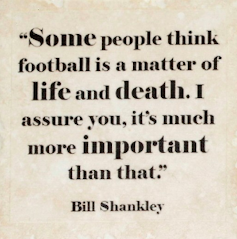There was a time when it would have been inconceivable a club of Celtic’s size and history would lose their manager to Leicester City.
That was the verdict of player-turned-pundit Jamie Carragher in the Telegraph last week, after Northern Irishman Brendan Rodgers departed one of Europe’s most famous and successful clubs for a lacklustre Leicester languishing in the middle of the English Premier League (EPL).
As far as Celtic fans are concerned, the real “BR-exit” has not gone down well. It seems the Glasgow club was simply a stepping stone back to England – a career move.

But what has particularly irked fans is the timing. Rodgers has left Celtic at a crucial point in their campaign to win the “treble treble” – winning the Scottish Premiership, the Scottish Cup and the Scottish League Cup for an unprecedented third time in a row. For a man who professed to be a Celtic man and who dreamed of playing for them as a boy, this has cut deep with fans.
Carragher seemed to imply Rodgers’ new club will never be able to match the “meaningfulness” of Celtic (or Glasgow’s other massive team, Rangers, for that matter). And there’s little chance, despite its giant-killing premiership title win in 2016, that Leicester will ever be as successful as Celtic at home or in Europe.
One of the key reasons Leicester can’t be compared to the likes of Celtic and Rangers is that it will never denote the same sense of political, cultural and religious identity that forms the essence of Scotland’s two biggest clubs, as well as a number of others around the globe.
A matter of life and death?
Football has a very particular place in the social and cultural fabric of Scotland. Its fans have a keen understanding of the things that often constitute a club’s – and even a country’s – relationship with the game, within and beyond stadiums. And this is what Rodgers conveyed to Celtic fans on his arrival. He seemed to understand this particular football community, one that is largely, but not solely, made up of people of Irish immigrant descent.
Many clubs in England certainly acquire similar meaning through family, culture and memory. But Scotland is a different society in many ways. There are complex ethnic, religious and political dimensions that reach back into particular national, social and community histories.
Such things have rarely, if ever, been unifying forces in England. It is this deeply entrenched cultural history that adds another layer to football in Scotland and helps make the game more appealing and “meaningful” for many.
In terms of finances and global media profile, Scottish football is a backwater compared to the mega-rich landscape of its English neighbour. But when population size is taken into consideration, attendances in Scotland’s top flight are the highest in Europe on a per capita basis. England, Spain, Germany and Italy (the giants of European and world football) – Scotland outperforms them all.
Money, money, money
Still, despite all the attention the game garners in Scotland, the finances of clubs still don’t match those in many other countries. A major reason is that the Scottish game overly depends on gate receipts, while in the “big” football countries, the reliance is mainly on TV, media and advertising incomes, which have been flourishing exponentially for almost 20 years.
Large populations, good football, a large consumer base and sensationalised TV coverage equal more money – for big business, players, managers and agents. When it comes to money and power in football, England and the other big European countries are the places to be.
But more broadly – and critically – many fans in both Scotland and England fear for the soul of the game their countries invented. Big clubs owned by mega-rich foreign interests, now housed in corporate branded stadiums, have arguably been rendered “souless”. Although for now, they still attract legions of fans faithfully buying into expensive merchandising and sky-high ticket prices.
Some observers think all this has damaged the game. There is a strange disconnect; while spectator numbers are huge, fewer children are actually playing football. And priced out of these ritzy stadiums, many fans don’t travel to games but turn to live TV coverage instead.
Communities that traditionally based much of their identity around football clubs are diminishing. Technology is increasingly turning what were once communal experiences with real atmosphere into solitary events, watched on a smart phone or tablet – though Scotland still leads the way when it comes to fans watching their team in person.
Goodbye to all that
Carragher wrote of his disbelief that Rodgers could have considered abandoning Celtic for Leicester and along with it the chance to become immortal by winning the “treble treble”. For most Celtic fans, Rodgers has sold his soul and they have been betrayed. But perhaps Rodgers is simply a kind of modern-game pragmatist, a manifestation of what has been going on in the game in England and elsewhere for some time.
His desire to spend big to chase success is one of the reasons he left. Club directors have repeatedly stated they will back managers but they will not break the club. Even so, Celtic’s wage bill actually doubled during Rodgers’ time. But he wanted more, it seems, and Leicester City appears ready to spend to match his ambitions.
Many Celtic fans believe that the one-time golden boy has written himself into and back out of Celtic’s history. Carragher was probably spot on; Brendan Rodgers’ move south, to them, was unthinkable. They don’t like to think of their club, with its pride, identity and historic achievements – not to mention its position at the top of Scottish football – as a small fish.
But this is an era when money and power dominate the game; once again, football is a metaphor for much of the world we have created. Some might yearn for the days of the great managers like Jock Stein, Matt Busby and Bill Shankly – who uttered the immortal words about the importance of football. But would any of them have wanted to participate in what the modern game has become now?



 Australia’s major sports codes are considered not-for-profits – is it time for them to pay up?
Australia’s major sports codes are considered not-for-profits – is it time for them to pay up?  Trump Urges Hall of Fame Induction for Roger Clemens Amid Renewed Debate
Trump Urges Hall of Fame Induction for Roger Clemens Amid Renewed Debate  Los Angeles Mayor Says White House Must Reassure Fans Ahead of FIFA World Cup
Los Angeles Mayor Says White House Must Reassure Fans Ahead of FIFA World Cup  Native American Groups Slam Trump’s Call to Restore Redskins Name
Native American Groups Slam Trump’s Call to Restore Redskins Name  Trump Booed at Club World Cup Final, Praises Pele as Soccer’s GOAT
Trump Booed at Club World Cup Final, Praises Pele as Soccer’s GOAT  Trump’s U.S. Open Visit Delays Final, Fans Face Long Security Lines
Trump’s U.S. Open Visit Delays Final, Fans Face Long Security Lines 































